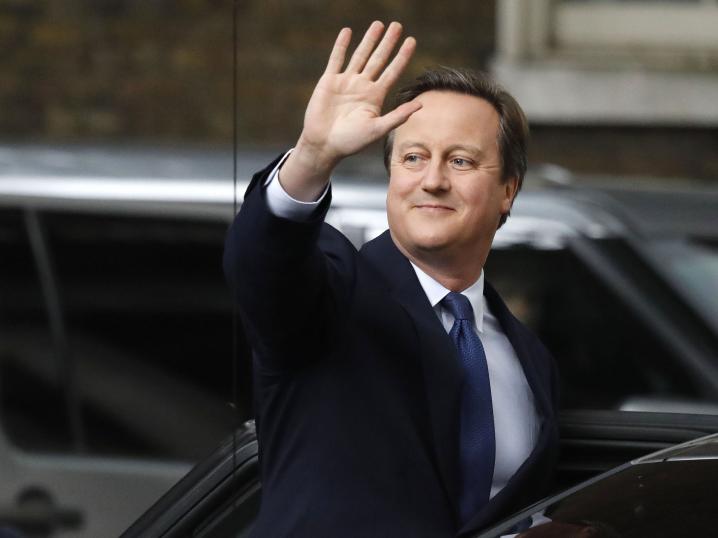Prime minister of United Kingdom David Cameron

David Cameron (born October 9, 1966, London, England) British Conservative Party leader who served as prime minister of the United Kingdom.Cameron, a descendant of King William IV, was born into a family with both wealth and an aristocratic pedigree. He attended Eton College and Brasenose College, Oxford, from which he graduated (1988) with a first-class degree in philosophy, politics, and economics. After Oxford he joined the Conservative Party Research Department. In 1992 he became a special adviser to Norman Lamont, then chancellor of the Exchequer, and the following year he undertook the same role for Michael Howard, then home secretary. Cameron joined the media company Carlton Communications in 1994 as director of corporate affairs. He stayed at Carlton until he entered Parliament in 2001 as MP for Witney, northwest of London.Cameron—young, moderate, and charismatic—quickly attracted attention as the leading member of a new generation of Conservatives. He was widely compared to Labour Prime Minister Tony Blair, who had acquired a similar reputation when he entered Parliament 18 years earlier. After just two years as an MP, Cameron was appointed to his party’s “front bench”—making him a leading Conservative spokesman in the House of Commons. In 2004 Howard, by then party leader, appointed his young protégé to the post of head of policy coordination, which put Cameron in charge of preparing the Conservatives’ 2005 election manifesto. The party, however, suffered a heavy defeat at the polls, provoking Howard’s resignation. Cameron’s self-assured speech at the party’s annual conference in October 2005 transformed his reputation, and he was subsequently elected Conservative leader.Cameron sought to modernize the party and shed its right-wing image. He announced that economic stability and strong public services would take priority over tax cuts in the next Conservative government. Under his leadership the party grew in popularity and placed first in the 2006 local elections; it was the Conservatives’ best showing at the polls in some 15 years.In the immediate aftermath of Gordon Brown’s succeeding Blair as Labour leader and prime minister in 2007, the Conservatives began to trail in the polls, encouraging the prime minister to consider calling a snap election to capitalize on Labour’s momentum. By the time Labour held its party conference in September, it had taken a double-digit lead over the Conservatives. But, at the Conservative Party conference in early October, Cameron made an impressive speech, talking for more than an hour without a script. In reference to the upcoming European Union summit in Lisbon to negotiate a treaty on reform, Cameron lambasted Brown for ruling out a referendum on an agreement (contrary to the prime minister’s commitment to hold one on a European constitution). In addition to other issues, Cameron also was critical of Labour’s performance on crime and with regard to the National Health Service (NHS). Most daringly, despite trailing in the polls, he goaded the prime minister to call an election.When Cameron returned to London with the agreement in hand, he received the backing of most of his cabinet, announced that he would campaign for Britain to remain in the EU, and scheduled the referendum for June 23, 2016. There were, however, dissenters within the cabinet who made it clear that they would support Britain leaving the EU. Arguably the most-prominent Conservative proponent of “Brexit” (as the British exit from the EU was popularly known) was Boris Johnson, the popular mayor of London. Cameron, who had already announced that he did not plan to seek another term as prime minister, quickly entered into a war of words with Johnson, who was widely perceived to have designs on becoming the next leader of the Conservative Party.In April 2016 Cameron came under fire when it was revealed that he, prior to becoming prime minister, had holdings in an offshore tax-haven-registered trust that had been created by his late father. That information came to light as part of a leak of more than 11 million documents (quickly dubbed the “Panama Papers”) from the secretive Panamanian law firm Mossack Fonseca, which exposed how a clutch of current and former world leaders as well as dozens of other politicians, public officials, and celebrities throughout the world had used tax havens to hide their wealth. Although Cameron had sold his shares in the trust before assuming office in 2010 and ostensibly had not violated any laws, the news was damaging for him because, as prime minister, he had taken a leading role in the fight against international tax evasion.Although opinion polling on the eve of the referendum showed both sides of the “Brexit” question fairly evenly divided, in the event, some 52 percent of British voters chose to leave the EU, setting the stage for the U.K. to become the first country to ever do so. An emotional Cameron addressed the country from outside 10 Downing Street on June 24 to announce his intention to resign as prime minister by the time of the Conservative conference in October 2016 to allow his successor to conduct the negotiations on the British departure: “I don’t think it would be right for me to try to be the captain that steers our country to its next destination.” He emphasized his belief that there should be no hurry about triggering Article 50 of the Lisbon Treaty, under which the EU and the United Kingdom would have two years to negotiate their separation.
c@icaldrcsrc:culturalindia/rc




